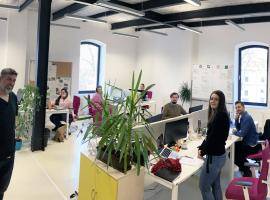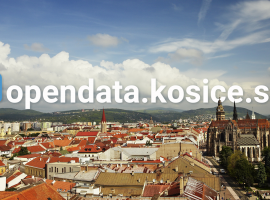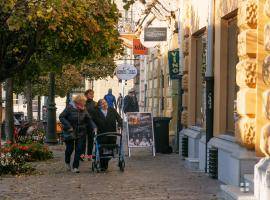Hack for Community has shown how technology can help communities in Košice

Each time City Hacks addresses a new topic corresponding to the current challenges that the city is facing and brings together creative people from different fields. Why is a hackathon a good choice, and what should I imagine under this term? We talked to its organizer Marek Lavčák.
Reach the finish line with a good solution
“Hackathon is a term used mainly in the IT community. The name itself was created by combining two words – a hack for experimental coding and a marathon, i.e., a period of time during which the participants are exposed to a certain pressure to reach the finish line successfully,” explains Marek. In the case of City Hacks, the goal is to solve a challenge formulated by the city of Košice. It is related to important topics for improving the quality of life in the city, but they are forgotten in addition to work and daily responsibilities. “Thanks to hackathons, we will be able to create space as if by force, but in a positive sense. For example, we’ll say – during these 24 hours, we will look at communities innovatively. This is the advantage of hackathons – it is a competition with a time limit and defined rules, and at the same time the opportunity to focus on what people do not have time for during their daily work.”

Communities in the city and open data
The common goal of hackathons is to improve the quality of life in the city through the enhanced civic participation of its inhabitants. “We want to show the people of Košice that they can transform their city with their own activity and creativity. Today, we addressed community life as we identified it as something that has resonated with the locals for quite some time. Communities exist in our city, but they need to be better established and professionalized. It’s not just something I recognize as representative of the startup community. Still, it’s something that people from the cultural or the creative industry have commented on as well,” says Marek.
“We expect the city will soon have the first complete datasets available, which will be possible to work with. Access to open data is something that Košice, as the second-largest city in Slovakia, urgently needs.” Marek has many other ideas for areas where the hackathon could bring long-awaited improvements. They concern, for example, transport, the quality of public space, or business support.
Who are the participants of City Hacks
Traditionally, hackathons are for people from the IT industry. However, this does not apply to City Hacks. “We hosted programmers, marketers, and business people here, but also those who have nothing to do with IT. It doesn’t matter what field you come from, the idea, its feasibility, and the potential impact on the city are important.” The output can be an application, a website, a marketplace, and the concept for organizing public events, urban intervention, or a working community space. The multidisciplinary team is an absolute advantage in this respect.

What’s next for the ideas
After a 24-hour creative marathon, the presentations of five teams took place. The winner was the team nolimit | DEVELOPERS, which prepared a tool for community chatting. It can easily be used in any community that can integrate it into their own website or application.
“In the Košice 2.0 project, we have several programs that are focused on idea development. Those ideas that did not win the hackathon should not be forgotten. They have the opportunity to continue in the acceleration program. There will also be another challenge called Inovuj ty! (Innovate!), in which the inhabitants or local NGOs will be able to participate,” specifies Marek. The municipality will adopt the winning solution, further develop it and eventually implement it.
Although the first City Hack topic was not easy, it managed to bring together people interested in the Community and are also technically proficient. “The mere fact that a humanity-oriented topic such as community life has managed to attract people from IT and the business community gives me hope. If people take away from these two days that technology can help even in non-profit areas, we can consider Hack for Community a success,” adds Marek.
Finally, we have to thank the teams: boostello, Casanga, Elon & Delon, nolimit | DEVELOPERS, and True for their perfect performance during the first City Hack.

Read more about our activities Košice 2.0, on our website























